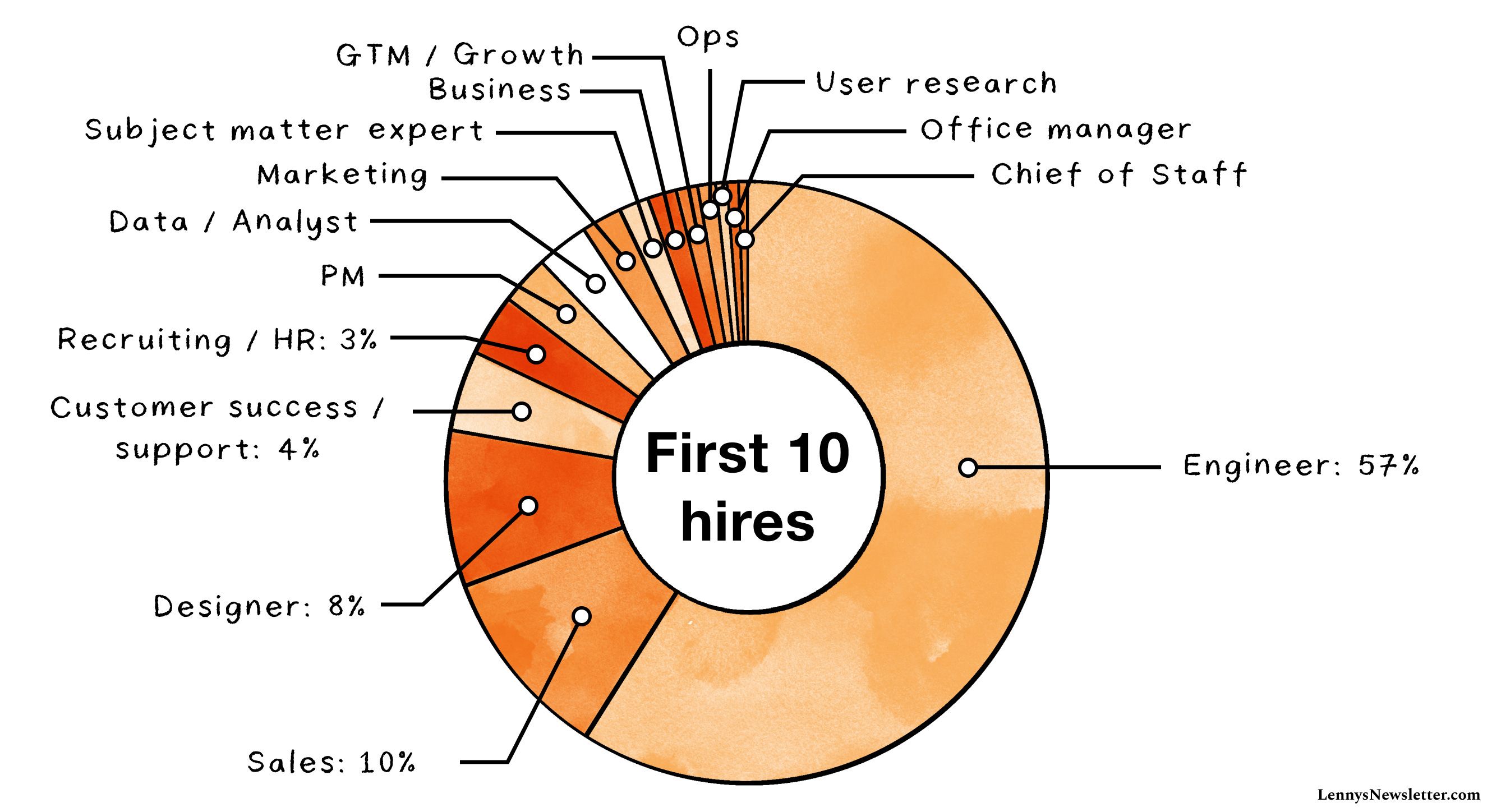Introduction
Based on more than a decade in the industry and many projects created for our clients, I can identify several patterns that cause inefficiencies in software development. Their result is overspending. I know that for many founders, there is no such thing as "spending too much money". However, a real problem is spending a lot of money without achieving the expected results. It’s an issue that, while prevalent, is often preventable with the right strategies and awareness.
And that is what I want to focus on in this article. I will delve into the common traps within product development, staffing, and marketing, showing where these inefficiencies are most often found. However, I will not leave you with only theoretical knowledge. I will conclude with some proven strategies on how to avoid them.
Common Areas Where Founders Overspend in Tech
Product Development
Steering a product from concept to market demands more than entrepreneurial zeal; it requires a strategic, well-rounded approach that actively mitigates common founder mistakes.
Mistake 1: No Real Verification of an Idea
Overestimating the significance of the problem your product aims to solve spells trouble. The failure of 42% of apps due to a lack of user needs underscores the vital importance of rigorous market validation. This requires proactively engaging with potential users, meticulously analyzing competitors, and vigilantly tracking market trends before the development phase kicks in.
Many founders overconfidently trust the initial idea. The allure of becoming the next tech giant can overshadow the necessity of thorough, objective scrutiny of the idea's practicality and market relevance. Only some ideas that look great on paper will work in reality.
Why is verification so crucial? It helps identify two key appeals on which any product should be based:
- whether the problem is big enough
- whether our solution will actually solve the problem and they will be willing to pay for it
Lack of investment in this area results in investing too much in other areas. Moreover, it is a great tool to validate where to invest and where to cut costs.
Mistake 2: Building Excessive Features Without Market Validation
This mistake follows directly from the previous one. In the absence of proper knowledge and verification, it is easy to go down the road of creating more and more features. This path can lead to a bloated project that will take a lot of time and money. Before investing in feature development, you should validate each feature’s relevance and demand in the market to ensure that every development dollar is judiciously spent.
Mistake 3: Budgetary Shortfalls
Allocating the entire budget to MVP development, leaving no room for subsequent promotion and launch, effectively stalls a product before it even hits the market. Even the most impeccable MVP fails to generate revenue or attract investments if it never sees the light of day due to budgetary constraints.
Early Hiring
Founders are often confronted with critical decisions concerning who to hire and when especially on the first stage of the startup journey. Interestingly, there is a pattern of recurring mistakes that many of them make during this crucial phase.
Mistake 1: Misjudging the First Hire
Numerous founders err by not prioritizing engineers as their initial hires. A striking observation from various successful startups reveals that over two-thirds of them opted for an engineer as their first employee. The oversight, notably when the founding team needs more robust technical acumen, can stymie the development of a viable product.
Mistake 2: Undervaluing Product Manager Competences
This is one of the most common mistakes that leads to inefficiencies in the first stage of product development. Focusing on solutions and building the project is essential, but every team needs Product Manager competencies, which focus on user needs.
However, this does not mean that not hiring a Product Manager as one of the first people in the company is a vast and clear mistake. That's why I'm writing here about competencies, not the roles. When recruiting, mindset is the most critical factor. People focused on solutions will push solutions rather than focusing on problems. Those with Product Manager skills will focus on real problems and their solutions, which should positively impact your product development.
Mistake 3: Overlooking Subject-Matter Experts
A prevalent mistake also manifests in neglecting to hire subject-matter experts early on, particularly for startups venturing into complex, regulatory-oriented markets. Such oversight can derail the alignment of product development with specific industry compliance and needs.
Marketing
Many startups spend too much on marketing due to scattered efforts, not using data, making uninformed choices, unchecked ad costs, overlooking automation, and being too hasty. With tight budgets, startups should focus on targeted and data-driven marketing to get the most value. While advertising is essential for growth, many startup leaders struggle to manage their marketing budgets correctly. Let's look at where they often make mistakes:
Mistake 1: Lack of a Clear Vision of What You Want to Achieve
Many founders think that marketing is a simple solution: I will pour money, and in return, I will increase sales of my product. And this may indeed be the case, but only when this marketing is done well. You can only perform well by knowing precisely what you want to achieve. More than merely wanting to increase sales is needed. It is necessary to clearly define the ICP, the markets and the problems that your product solves.
This can lead to further mistakes leading to budget and time overruns, such as overfunding Ad budgets and spreading marketing too thin. Spending robustly on advertising without ensuring the product genuinely resonates with the market can result in squandered finances without achieving the intended effects. Effective marketing, especially for startups, should focus on a few platforms that genuinely resonate with the target audience. Without knowledge of the target group and its needs you can end up with getting enticed by too many available channels.
Mistake 2: Misuse of marketing agencies
Cooperation with marketing agencies is usually a good solution for startups. They offer domain knowledge and allow you to achieve the desired results quickly, but they often come with a hefty price tag, especially when misused. What do I mean by that? A situation in which you start working with an agency without prior agreement on specific goals and expected outcomes. Without catching up on how to work together at the beginning, agency engagements can rapidly burn through marketing budgets without guaranteed ROI, particularly for startups where budgets are usually finite and meticulously allocated.
Mistake 3: Underestimating analytics
Despite the essential role of analytics in shaping data-driven marketing strategies, a significant percentage of founders underestimate its importance. Neglecting data analytics means ignoring the potential for optimized spending and targeted marketing actions. Data-informed decisions are crucial to ensuring that marketing spending converts to tangible results. Investing in marketing strategies without in-depth research is a common and costly mistake. Founders, occasionally guided by instinct or partial insights, might allocate funds towards a platform or method that doesn’t yield adequate ROI. Prioritizing thorough research and data mitigates the risk of these financially detrimental choices. Lack of attention to analytics can also result in losing Track of Ad Spend.
Reasons for Overspending
This section explores why founders frequently overspend. The reasons fall into two categories: mental and technical. Each comes with its own challenges and requires different strategies.
Competitive Pressure & FOMO
Startups often put founders under immense pressure, as a Balderton survey of 230 founders highlighted. The study found that 89% see the startup world as competitive and stressful. Most (82%) believe working long hours is just part of being an entrepreneur. This constant work, mixed with the need to always be available, leads to more stress and poor decision-making. Founders say that neglecting self-care for work hurts their strategic thinking and business. This drive to outdo rivals, driven by a fear of missing out, can lead to spending on things that don't align with the actual market needs or their business plan.
When interviewing founders, I have encountered a strong desire to make their idea and the product itself unique and revolutionary. It's evident that everyone wants to be the next Uber or Airbnb, but it's just not possible. No idea is unique. The key is to solve the problem better than the competition. Without this mindset, the time pressure is much less, and the whole team can focus on making sure the solution doesn't come faster but is as good as possible.
Exploitation and Misuse by External Actors
Emerging startups frequently grapple with the issue of exploitation by various stakeholders, escalating costs and paving the way for inadvertent overspending. Vulnerability to exploitation could stem from myriad factors, including a dearth of experience, insufficient control mechanisms, or simply an understaffing issue coupled with a lack of specific domain expertise.
A commonplace scenario involves marketing and advertising agencies capitalizing on founders’ limited knowledge in the field, thereby inflating advertising budgets to bolster their profits while failing to deliver the promised results. Similarly, some employees, riding the wave of founders' enthusiasm, may leverage the situation to secure higher remuneration while contributing minimally, further straining the financial resources of the startup. To deal with these unfair practices, you need to be smart and have a plan to protect the money of your new business, by choosing outcome focused partners.
Too Wide Tech Scope
One of the most important reasons for spending too much on creating a product is the team's lack of understanding of what they are building. I have often encountered a situation where the founder draws the reality of what he wants to build in 5 years. The team, seeing such a far-off perspective, tries to design to be able to add all the ideas. Instead of an easy and simple solution, they create a very long and extended one, with a considerable cost in time. There is rarely a situation where the original development plan has come to fruition to such an extent that such an approach would be justified. This is also due to how developers work. Most of them want to create bulletproof, purist code. Ideally, they should be able to use the latest frameworks in the project. For Startups, good code is not clean, but it is one that we can change quickly based on new insights.
Strategies to Avoid Overspending
Fortunately, there are several strategies to reduce the chances of overpaying in the early stages of a startup's development. In this section of the article, you'll find three of them that are universal and relevant enough that they should work for most cases.
Market Alignment
From our work with clients, one strategy stands out as crucial for startups: understanding user needs. Even with a great team and a big budget, success isn’t guaranteed without this. Entrepreneurs, driven by innovation and a desire to challenge norms, face an exciting yet challenging path. An essential part of this path, especially for startups in new markets, is ensuring their new ideas are well-received. This idea, often simplified as product-market fit, is about a more profound concept: Market Alignment.
Startups don't just randomly try to meet market demand with their new products. It's more of a dance where the company and market slowly come together. Market alignment is more than just finding a product-market fit (PMF). It's a constant process where a startup adjusts to the changing needs of new markets.
Market alignment is key to a startup's success, especially in new markets. It's not just about finding a PMF but a continuous story of the company and market adapting. The goal is for products not just to meet but also to shape market demands.
Mindful Team Building
Building a team that shares your vision and complements the core competencies needed to make this vision a tangible reality is paramount. In the seminal stages of a startup, especially when product potential and user adoption are pivotal, whom to hire becomes a strategic decision enveloped in various factors.
First Hires
Let's listen to the founders themselves to understand who is best to hire at the first stage of a company's development. Lenny Rachitsky interviewed 19 founders of well-known startups about their first ten hires. Here are the results:

First 10 hires based on successful founders. Source: Lennys Newsletter.
A common thread among startup founders, particularly in tech-oriented startups, is a marked inclination towards hiring developers as initial team members. With over two-thirds of companies prioritizing technical talent as their first hire, the message is clear: building a robust, functional, and user-centred product is paramount.
When an engineer isn't the first hire, the variance usually lies in the founding team's ability to shoulder the technical burden temporarily. This allows them to strategically un-bottleneck other critical aspects of the startup journey, such as compliance in complex markets or focusing on recruitment for subsequent growth.
Intertwining Technical and Customer Focus
Technical skills are important, but so is the team that supports the Discovery phase. Early on, customer support roles have become more crucial than even sales roles. Founders know that a strong relationship with users from the start is key. Segment's method is a great example. They combined technical support with customer success, ensuring quick and efficient solutions for users. This built trust with their early users. Building the right team is more than a strategy; it's a guiding principle. Startups need to make sure every early hire aligns with their goals for product quality and user happiness. This helps them stay on the path to success and achieve their vision.
Our tip: In the first stage, invest more in the product manager competencies than the developers. Most developers love to write code and may focus on building the product and adding more functionality as quickly as possible. It is essential to have a good product manager to guide them so that the code produced has real value for users.
Seeking Expert Consultation
Starting a startup means navigating a complex path where making smart decisions is crucial. Getting guidance on things like tech, budgeting, and finances is essential for your business to grow steadily and avoid overspending. Wise counsel helps manage risks and use resources effectively, guiding the startup towards its goals.
Use the Power of Community
Communities are a guiding light for new startups. Remember, you're not alone in this journey. Many entrepreneurs have faced similar challenges and found solutions. Joining a community isn’t just advice; it's a chance to learn from others' experiences. Networking with those who've tackled similar issues gives you new ideas, solutions, and ways to avoid common mistakes. This includes not just other founders but also mentors and experts who offer unbiased views, which can be refreshing.
Don't limit yourself to your team
While expert advice is crucial, you don't need to hire an agency for everything. As a smart founder, it's essential to mix your team's skills with outside experts. Sometimes, consulting a specialist for specific advice is more cost-effective than handing a whole project to an agency. Don't just rely on your team. Outside consultation might cost money, but it can save you from bigger problems down the line.
In our work with early-stage clients, we've seen how our experience helps their products grow fast. A customer-focused approach and fresh perspectives can lead to insights that benefit product development.
Conclusion
Navigating the tech startup world is a balance of ambition and smart spending. By recognizing common pitfalls and using strategies like understanding market needs, building the right team, and seeking expert advice, startups can avoid unnecessary costs. While rapid growth is appealing, making informed and careful decisions is key to long-term success. Your startup's journey is unique, but armed with the right insights and a commitment to learning, you're well poised to make it a triumphant one.



